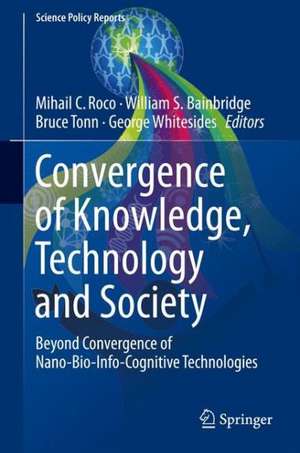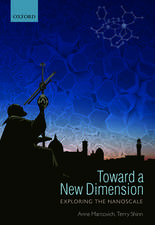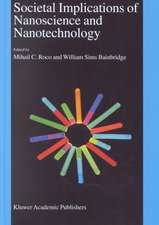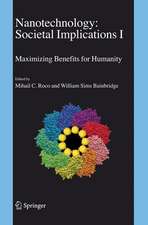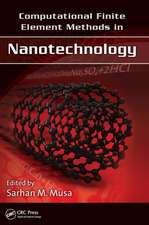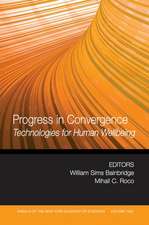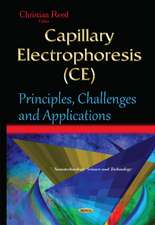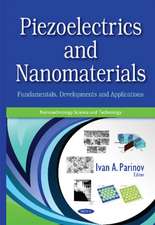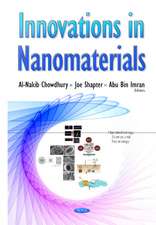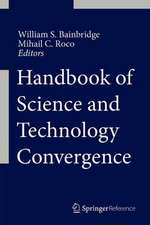Convergence of Knowledge, Technology and Society: Beyond Convergence of Nano-Bio-Info-Cognitive Technologies: Science Policy Reports
Editat de Mihail C. Roco, William S. Bainbridge, Bruce Tonn, George Whitesidesen Limba Engleză Hardback – 11 feb 2014
| Toate formatele și edițiile | Preț | Express |
|---|---|---|
| Paperback (1) | 1057.93 lei 39-44 zile | |
| Springer International Publishing – 30 apr 2017 | 1057.93 lei 39-44 zile | |
| Hardback (1) | 1247.26 lei 6-8 săpt. | |
| Springer International Publishing – 11 feb 2014 | 1247.26 lei 6-8 săpt. |
Preț: 1247.26 lei
Preț vechi: 1521.05 lei
-18% Nou
Puncte Express: 1871
Preț estimativ în valută:
238.72€ • 248.28$ • 200.05£
238.72€ • 248.28$ • 200.05£
Carte tipărită la comandă
Livrare economică 13-27 martie
Preluare comenzi: 021 569.72.76
Specificații
ISBN-13: 9783319022031
ISBN-10: 3319022032
Pagini: 450
Ilustrații: LVI, 558 p. 102 illus., 100 illus. in color.
Dimensiuni: 155 x 235 x 32 mm
Greutate: 1.29 kg
Ediția:2013
Editura: Springer International Publishing
Colecția Springer
Seria Science Policy Reports
Locul publicării:Cham, Switzerland
ISBN-10: 3319022032
Pagini: 450
Ilustrații: LVI, 558 p. 102 illus., 100 illus. in color.
Dimensiuni: 155 x 235 x 32 mm
Greutate: 1.29 kg
Ediția:2013
Editura: Springer International Publishing
Colecția Springer
Seria Science Policy Reports
Locul publicării:Cham, Switzerland
Public țintă
ResearchCuprins
Acknowledgements.- Study Team and Report Authors.- External Reviewers.- Preface (Executive Summary).- Overview and Recommendations.- 1 Convergence Platforms: Foundational Science and Technology Tools.- 2 Convergence Platforms: Human-Scale Convergence and the Quality of Life.- 3 Convergence Platforms: Earth-Scale Systems.- 4 Methods to Improve and Expedite Convergence.- 5 Implications: Human Health and Physical Potential.- 6 Implications: Human Cognition and Communication and the Emergence of Cognitive Society.- 7 Implications: Societal Collective Outcomes, including Manufacturing.- 8 Implications: People and Physical Infrastructure.- 9 Implications: Convergence of Knowledge and Technology for a Sustainable Society.- 10 Innovative and Responsible Governance of Converging Technologies.- Appendices A - H.
Notă biografică
Dr. Mihail C. Roco is the Senior Advisor for Nanotechnology at the National Science Foundation (NSF) and a key architect of the National Nanotechnology Initiative. Dr. Roco is the founding Chair of the U.S. National Science and Technology Council’s Subcommittee on Nanoscale Science, Engineering and Technology (NSET) and established the Nanotechnology Group of the International Risk Governance Council. Prior to joining National Science Foundation, he was Professor of mechanical and chemical engineering. Dr. Roco is credited with thirteen patents and has contributed over two hundred archival articles in sixteen books including recently 'Managing Nano-Bio-Info-Cognition Innovations' (2007) and 'Mapping Nanotechnology Knowledge and Innovation: Global and Longitudinal Patent and Literature Analysis' (2009). Dr. Roco is a corresponding member of the Swiss Academy of Engineering Sciences and a member of the International Risk Governance Council. His research included experimental and simulation methods to investigate nanosystems. He formally proposed the National Nanotechnology Initiative (NNI) in a presentation at The White House OSTP, Committee on Technology, on March 11, 1999. He conducted research, teaching, consulting to industry, and international organizations in the Americas, Europe, Japan, and Australia. He is a Fellow of ASME, Fellow of AIChE and Fellow of the Institute of Physics. He was elected Engineer of the Year by the U.S. Society of Professional Engineers and NSF in 1999 and again in 2004. He was honored as recipient of the Carl Duisberg Award in Germany, the 'Burgers Professorship Award' in The Netherlands, and the 'University Research Professorship' and Fingerson/TSI awards in the U.S. He received the National Materials Advancement Award from the Federation of Materials Societies in 2007 as 'the individual most responsible for support and investment in nanotechnology by government, industry, and academia worldwide'.
William SimsBainbridge is an American sociologist who currently resides in Virginia. He is co-director of Human-Centered Computing at the National Science Foundation (NSF). He is the first Senior Fellow to be appointed by the Institute for Ethics and Emerging Technologies. Professor Bainbridge is most well known for his work on the sociology of religion. He has published extensively on the sociology of computer gaming, and he has pioneered the use of online virtual worlds for scientific conferences and research proposal review panels. He has edited two major reference works relevant to NBIC, The Encyclopedia of Human-Computer Interaction and Leadership in Science and Technology. His doctoral research and first book concerned the social movement dedicated to exploration of outer space, and he has returned to that topic for the book he is currently writing, examining the social and intellectual barriers to future progress in that direction.
Bruce Tonn, is a professor at the University of Tennesee. Dr. Tonn's research focuses on environmental and energy policy, futures studies, sustainability, and policy decision making methods. It also includes uncertainty methods, technology policy, computers in society, and social theory.
George Whitesides, is a Woodford L. and Ann A. Flowers Professor at Harvard University. His research interests are: physical and organic chemistry, materials science, biophysics, complexity and emergence, surface science, microfluidics, optics, self-assembly, micro- and nanotechnology, science for developing economies, catalysis, energy production and conservation, origin of life, rational drug design, cell-surface biochemistry, simplicity, and infochemistry.
William SimsBainbridge is an American sociologist who currently resides in Virginia. He is co-director of Human-Centered Computing at the National Science Foundation (NSF). He is the first Senior Fellow to be appointed by the Institute for Ethics and Emerging Technologies. Professor Bainbridge is most well known for his work on the sociology of religion. He has published extensively on the sociology of computer gaming, and he has pioneered the use of online virtual worlds for scientific conferences and research proposal review panels. He has edited two major reference works relevant to NBIC, The Encyclopedia of Human-Computer Interaction and Leadership in Science and Technology. His doctoral research and first book concerned the social movement dedicated to exploration of outer space, and he has returned to that topic for the book he is currently writing, examining the social and intellectual barriers to future progress in that direction.
Bruce Tonn, is a professor at the University of Tennesee. Dr. Tonn's research focuses on environmental and energy policy, futures studies, sustainability, and policy decision making methods. It also includes uncertainty methods, technology policy, computers in society, and social theory.
George Whitesides, is a Woodford L. and Ann A. Flowers Professor at Harvard University. His research interests are: physical and organic chemistry, materials science, biophysics, complexity and emergence, surface science, microfluidics, optics, self-assembly, micro- and nanotechnology, science for developing economies, catalysis, energy production and conservation, origin of life, rational drug design, cell-surface biochemistry, simplicity, and infochemistry.
Textul de pe ultima copertă
Convergence of knowledge and technology for the benefit of society (CKTS) is the core opportunity for progress in the 21st century, based on five principles: (1) the interdependence of all components of nature and society, (2) enhancement of creativity and innovation through evolutionary processes of convergence that combine existing principles, and divergence that generates new ones, (3) decision analysis for research and development based on system-logic deduction, (4) higher-level cross-domain languages to generate new solutions and support transfer of new knowledge, and (5) vision-inspired basic research embodied in grand challenges. Solutions are outlined for key societal challenges, including creating new industries and jobs, improving lifelong wellness and human potential, achieving personalized and integrated healthcare and education, and securing a sustainable quality of life for all. This report provides a ten-year “NBIC2” vision within a longer-term framework for converging technology and human progress that began with a previous study on “NBIC” fields: nanotechnology, biotechnology, information technology, and cognitive science (Roco and Bainbridge, 2003).
This is truly an impressive body of work, which advances a transformative collection of concepts that could impact many areas of society and science. The ideas of this study are exciting.
Tinsley Oden, University of Texas, Austin (April 2013)
The CKTS study presents inspirational ideas behind the concept of convergence and identifies ground-breaking opportunities for human progress through such convergence.
Christos Tokamanis, Nanotechnology and Converging Technologies, EU, Brussels (May 2013)
The study provides a systematic and unified, internationally benchmarked framework for convergence that is relevant to policymakers, entrepreneurs, researchers, and the generalpublic.
Jo-Won Lee, Hanyang University, Korea (June 2013)
I consider .. the first NBIC study in 2001.. as an historical landmark that has caused a new dynamic in the reflection on these new technologies within the broad scientific and governmental community.
Frank Theys, Co-producer for public broadcasters ZDF/ARTE, Germany & France (June 2013)
This is truly an impressive body of work, which advances a transformative collection of concepts that could impact many areas of society and science. The ideas of this study are exciting.
Tinsley Oden, University of Texas, Austin (April 2013)
The CKTS study presents inspirational ideas behind the concept of convergence and identifies ground-breaking opportunities for human progress through such convergence.
Christos Tokamanis, Nanotechnology and Converging Technologies, EU, Brussels (May 2013)
The study provides a systematic and unified, internationally benchmarked framework for convergence that is relevant to policymakers, entrepreneurs, researchers, and the generalpublic.
Jo-Won Lee, Hanyang University, Korea (June 2013)
I consider .. the first NBIC study in 2001.. as an historical landmark that has caused a new dynamic in the reflection on these new technologies within the broad scientific and governmental community.
Frank Theys, Co-producer for public broadcasters ZDF/ARTE, Germany & France (June 2013)
Caracteristici
Documents the most important worldwide accomplishments in convergence of knowledge, technology, and society Reports a study conducted by a panel of nine eminent scientists and researchers Highlights international opportunities to develop and apply convergence to support progress and broad societal benefits Includes supplementary material: sn.pub/extras
